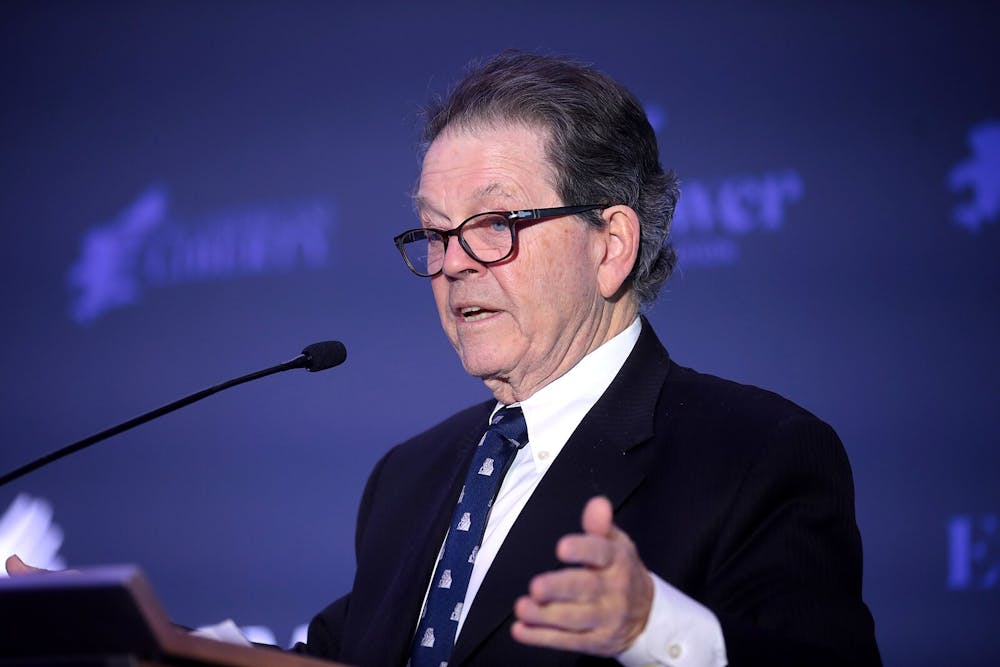A federal judge has dismissed all legal claims filed against University President Harvey Stenger and Vice President for Student Affairs Brian Rose in connection with two campus protests in 2019.
Filed in 2020 by the College Republicans and Young America’s Foundation, a nonprofit conservative youth advocacy organization, the lawsuit accused Stenger, Rose and John Pelletier, a former University police chief, of suppressing free speech and violating the equal protection clause of the Fourteenth Amendment. The allegations stemmed from two connected incidents in November of that year.
“We are pleased that Judge Kahn correctly dismissed all claims against President Stenger and VP Brian Rose and removed them from the docket,” a University spokesperson wrote to Pipe Dream.
The first took place on Nov. 14 while the College Republicans were tabling on the Spine with Turning Point USA, a conservative organization focused on building a “grassroots activist network on high school and college campuses.” They were tabling — without a prior reservation — primarily to advertise an event scheduled four days later featuring Arthur Laffer, an economist who served on Ronald Reagan’s Economic Policy Advisory Board.
Event flyers and a poster reading “I’M PRO CHOICE. PICK YOUR GUN” were displayed hours after a high school shooting in Santa Clarita, California. More than 100 protesters began to demonstrate and tear the flyers, according to Judge Lawrence Kahn’s March 20, 2025 decision.
“According to Pelletier, UPD officers determined that they could not safely arrest protestors at the scene because it seemed likely that an arrest would further escalate the protestors’ conduct,” the decision reads.
The College Republicans were eventually asked to relocate because they did not have a reservation.
The Student Association then suspended the College Republicans from B-There, the University’s room scheduling system, until the fall 2020 semester for tabling without a reservation. Rose opted not to pursue student conduct charges, arguing that the process was lengthy and would not deescalate tensions, according to the ruling.
Three days before Laffer’s speech, campus police saw social media posts indicating that College Progressives — dismissed from the lawsuit in 2023 — planned to protest the event. In response, administrators and police took steps to prepare, like moving the event to a larger space with multiple exits, reserving a separate lecture hall for demonstrators, deploying more police and installing cameras.
On the morning of Nov. 18, the University’s senior director of media and public relations forwarded a College Progressives email and a separate online post to Rose, campus police and other administrators. The post said some groups, including Progressive Leaders of Tomorrow, “will be taking away … the College Republicans’ space by disrupting their event.” Pelletier met Laffer at the airport and warned him of the potential disruption, but Laffer said in a deposition that Pelletier had told him that the University “did not want [him] to come” and implied that he should return to his plane.
The lecture was disrupted almost immediately when a man stood up and read a speech addressing topics like economics and racial oppression. Laffer left around two-and-a-half minutes later, with campus police arresting the initial protester and another person who passed a megaphone to him.
Initially in favor of arresting more suspects, Rose eventually supported Stenger’s decision not to make further arrests. During a meeting with administrators, the Student Association told Rose it would not take disciplinary action against the College Progressives.
Plaintiffs argued that Stenger, Rose and Pelletier suppressed free speech in their official capacities. Defendants motioned for summary judgment, a procedure that allows a court to decide legal claims without a trial if there is no genuine dispute of material facts.
The court granted summary judgment on the defendants’ motions as officials and dismissed the plaintiffs’ claims under the 11th Amendment. Kahn also dismissed a First Amendment speech suppression claim against Rose as an individual.
Kahn denied Pelletier’s motion for summary judgment in an individual capacity, finding a genuine dispute of fact over whether Pelletier ordered Laffer to leave the Lecture Hall. The decision added that “the record does not establish any imminent danger or immediate threat to public safety.”
“As such, it can hardly be said that there was any sort of danger or other immediate threat to public safety that could present a compelling government interest in canceling the lecture,” it reads.
He also ruled Pelletier’s action was not “reasonable or viewpoint-neutral” because there was no immediate threat to public safety and protesters were essentially allowed to demonstrate. Based on these findings, the court also denied summary judgment on the equal protection claim.
The court also partially denied the Student Association’s summary judgment motion on the plaintiff’s retaliation claim, finding a general dispute of material fact over whether the suspension of College Republican’s access to B-There was retaliation. Kahn found, however, that there was “no causal connection” between the suspension and a temporary funding freeze in 2020.
Kahn granted summary judgment for Stenger as an individual, concluding that Stenger’s actions were “not sufficient” to show he was personally involved “in the disciplining of the College Republicans.” Rose was entitled to summary judgment against the First and Fourteenth Amendment claims. While plaintiffs argued Rose’s failure to discipline College Progressives was evidence of bias against College Republicans’ protected speech, Kahn said Rose’s initial desire to punish protesters cut against this.
The Student Association declined to comment. The College Republicans did not return a request for comment.



